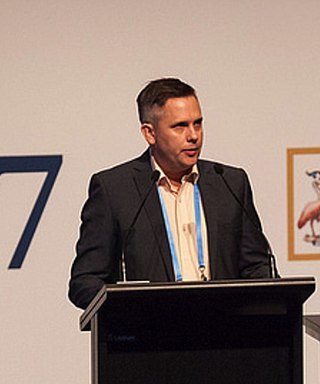
Genetic counseling is the process of investigating individuals and families affected by or at risk of genetic disorders to help them understand and adapt to the medical, psychological and familial implications of genetic contributions to disease. This field is considered necessary for the implementation of genomic medicine. The process integrates:
A medical specialty is a branch of medical practice that is focused on a defined group of patients, diseases, skills, or philosophy. Examples include those branches of medicine that deal exclusively with children (paediatrics), cancer (oncology), laboratory medicine (pathology), or primary care. After completing medical school or other basic training, physicians or surgeons and other clinicians usually further their medical education in a specific specialty of medicine by completing a multiple-year residency to become a specialist.

Medical genetics is the branch of medicine that involves the diagnosis and management of hereditary disorders. Medical genetics differs from human genetics in that human genetics is a field of scientific research that may or may not apply to medicine, while medical genetics refers to the application of genetics to medical care. For example, research on the causes and inheritance of genetic disorders would be considered within both human genetics and medical genetics, while the diagnosis, management, and counselling people with genetic disorders would be considered part of medical genetics.

The Royal Australasian College of Physicians (RACP) is a not-for-profit professional organisation responsible for training and educating physicians and paediatricians across Australia and New Zealand.
The American Society of Human Genetics (ASHG), founded in 1948, is a professional membership organization for specialists in human genetics. As of 2009, the organization had approximately 8,000 members. The society's members include researchers, academicians, clinicians, laboratory practice professionals, genetic counselors, nurses, and others who have a special interest in the field of human genetics.
David Owen Sillence is an academic and medical geneticist. He is an emeritus professor at the University of Sydney, where he was the foundation chair (Professor) of Medical Genetics. An honours graduate of the University of Sydney, he obtained his MD in Medical Genetics from the University of Melbourne 1978 in bone dysplasia.

The National Society of Genetic Counselors (NSGC), founded and incorporated in 1979, is the largest association of genetic counselors with over 3,600 members. Its membership includes genetic counselors and other healthcare professionals working in the field of medical genetics from the United States, Canada, and around the world.
B K Thelma commonly known as Bittianda Kuttapa Thelma is a professor in the Department of Genetics at the University of Delhi, South Campus, New Delhi, India. She is the Principal investigator and Co-ordinator of the Centre of excellence on Genomes Sciences and Predictive Medicine funded by the Govt. of India. She is also the Co-ordinator of a major project on newborn screening for inborn errors of metabolism in Delhi state which aims to demonstrate the feasibility of mandatory screening of newborns in the country and to generate epidemiological data for the testable IEMs in the genetically distinct Indian population, for the first time.
Kathryn Nance North is a paediatric physician, neurologist, and clinical geneticist. In 2013, she was appointed Director of the Murdoch Childrens Research Institute and was named the David Danks Professor of Child Health Research at the University of Melbourne. In 2012, North was appointed chair of the National Health and Medical Research Council Research Committee. In 2014, she was appointed vice chair of the Global Alliance for Genomics and Health (GA4GH) and co-chair of its Clinical Working Group.
Olga Margaret Garson, better known as Margaret Garson, was an Australian physician and cytogenetics researcher.

Sister Regis Mary Dunne RSM was an Australian scientist and Sister of Mercy, considered to be a pioneer in the field of genetics and bioethics.

The Australasian Association of Clinical Geneticists (AACG) is a professional membership organization for medical specialists who are qualified to work in the field of clinical genetics. The Association was founded in 1995. As of 2021, the organization had approximately 180 members. The Association's members include fully qualified clinical geneticists from Australia and New Zealand as well as individuals training in the field from those jurisdictions. The Association is a Special Interest Group of the Human Genetics Society of Australasia (HGSA).

Grant Robert Sutherland is a retired Australian human geneticist and celebrated cytogeneticist. He was the Director, Department of Cytogenetics and Molecular Genetics, Adelaide Women's and Children's Hospital for 27 years (1975-2002), then became the Foundation Research Fellow there until 2007. He is an Emeritus Professor in the Departments of Paediatrics and Genetics at the University of Adelaide.
Lyn Robyn Griffiths is an Australian academic who serves as Distinguished Professor of molecular genetics at Queensland University of Technology, where she is director of the Centre for Genomics and Personalised Health, the Genomics Research Centre and the BridgeTech Programs. Griffiths is internationally renowned for her work in the discovery of the genetics of migraine headaches.
The Association for Molecular Pathology is a professional association of individuals serving patients through molecular diagnostics testing. Founded in 1995, the Association has more than 2,800 members in over 50 countries.

Michael Terrence Gabbett is an Australian clinical geneticist and academic. He holds academic titles at a number of universities in South East Queensland. Gabbett is known for contributing to discovering the genetic basis of semi-identical (sesquizygotic) twins and defining the clinical features and molecular cause of Temple-Baraitser syndrome.
John Christodoulou is an Australian medical geneticist, genetic pathologist and clinical scientist. He is director of the Genetics Theme and Group Co-Leader of the Brain and Mitochondrial Research Group at Murdoch Children's Research Institute. Additionally, he holds the Chair in Genomic Medicine, Department of Paediatrics, The University of Melbourne.







